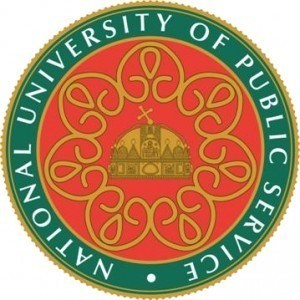Photos of university / #uni.nke
The Master’s Degree Program in Military Engineering Sciences at the National University of Public Service is designed to prepare highly skilled professionals for the complex and demanding field of military engineering. This comprehensive program provides students with advanced knowledge and practical skills necessary to plan, design, and execute engineering projects in various military and defense contexts. The curriculum covers a wide range of topics, including military infrastructure, construction management, defense technology, cryptography, combat engineering, and the application of engineering sciences in national security. Emphasizing both theoretical understanding and practical application, the program ensures graduates are well-equipped to address the challenges faced by modern armed forces and security agencies. Students have the opportunity to learn from experienced faculty members with extensive military and academic backgrounds, gaining insights into current defense strategies and innovative engineering solutions. The program also offers hands-on training through laboratory work, field exercises, and internships with defense organizations, enabling students to apply their knowledge in real-world scenarios. Interdisciplinary coursework promotes critical thinking, problem-solving, and leadership skills, preparing graduates for careers in military engineering units, defense technology firms, government security agencies, and related fields. Graduates will be capable of contributing to national security by designing and managing critical military infrastructure, developing new defense technologies, and supporting military operations through advanced engineering solutions. The program aims to foster a sense of discipline, responsibility, and commitment to public service among its students, aligning with the mission of the National University of Public Service to educate future leaders in public security and defense. With a focus on innovation and strategic thinking, the Master’s Degree in Military Engineering Sciences prepares students not only for immediate professional challenges but also for lifelong careers in a dynamic and evolving field.
The Doctoral School of Military Engineering focuses on fields of research that are specifically related to the military application of engineering. This includes the training and preparation for scientific research in various related fields ranging from basic and applied researches and development, through technology and technology-transfer to technological innovation.
The Doctoral School of Military Engineering focuses on 7 areas of research:
- Military Engineering Infrastructures
- Military Technology and Robotics
- Defence Electronics and ICT
- Environmental Security and Disaster Management
- Military Logistics and Defence Economy
- Security Technology
- Defence Management
The training of the Doctoral School is available in the following forms:
• organised training
- full-time training (funded by scholarship or individually through tuition fee)
- part-time (funded individually through tuition fee)
- individual training (funded individually through tuition fee)
• individual preparation
The organised training lasts 6 semesters and applies the system of credit points. In order to successfully end their training and receive their leaving certificate (absolutory) by the end of the 6th semester, PhD students must obtain at least 180 credit points in accordance with the following criteria:
- study obligations (min. 50 credits)
- scientific research work (min. 120 credits)
- holding lectures (max. 10 credits)
Having successfully finished their PhD studies, students of the Doctoral School will have gained a knowledge that enables them to participate with great advantage in the competition for higher ranking scientific positions in various fields of expertise within the public and the private sector as well.
(1) Students enrolled in an organised programme may pursue their studies in organised full-time
(funded from scholarship or self-paid) or in organised part-time (self-paid) or in an individual
programme.
13
(2) In an organised PhD programme, the period available for the fulfilment of the obligations set
forth in these Regulations equals up to six semesters, and, in respect of programmes funded from
a scholarship, the scholarship will be disbursed for up to six semesters.
(3) The doctoral schools may permit the interruption of a study period on up to three occasions, for
a total period of three years (leave of absence for an academic year). The interruption of the
student status at one time may exceed two semesters. A student may only interrupt a study
programme after the successful completion of the first semester. An application for suspension
must be accepted on the first occasion. During the suspension of the student status, state
scholarship may not be disbursed.
(4) The student status is also suspended if the student is unable to fulfil his or her obligations arising
from the student status due to childbirth, accident, illness or any other unexpected cause (long-
time study abroad), through no fault of his or her own. The restrictions described in paragraph
(3) do not apply in the cases set forth in this paragraph. The student shall be bound by a
notification requirement also in this case.
(5) With regard to all types of PhD programmes, the meeting of the requirements involving work
time, set as a precondition for obtaining the doctoral pre-degree certificate must be measured in
study points (credits).
(6) An organised programme assists a PhD student in acquiring the knowledge and the individual
research experience required for obtaining a PhD degree. To this end, a PhD student participated
in academic courses, performs individual research activities and may also undertake lecturing
tasks.
(7) A three-year programme consists of six active semesters. Over the course of the programme, at
least 180 credits must be obtained in total. In the period of coursework, a PhD student may take
up, with no additional tuition fees required, subjects of a credit value exceeding the total number
of credit required by 10 per cent. Thus, on completion of the programme, a total of 198 credits
may be recognised on his or her part.
(8) The units of a PhD programme, the minimum and expected number of credits that may be
obtained in each module, the academic requirements and those relating to scientific research
work and lecturing must be set forth in the academic and examination regulations of doctoral
schools (DS AER).
(9) Rules relating to concurrent programmes and foreign studies must be set forth in the academic
and examination regulations of doctoral schools.
(10) The rules relating to the recognition and accounting of credits obtained by a student enrolled in a
PhD programme for subjects taken in the doctoral school of another faculty or institute must be
set forth in the academic and examination regulations of doctoral schools. With regard to credit
recognition, the provisions of the Diploma and Credit Recognition Regulations of the University
must be also applied.
(11) The planning and reporting obligations of a PhD student and his or her supervisor, the scheme of
testing the knowledge of a PhD student and the order of examination period must be set forth in
the academic and examination regulations of doctoral schools, in accordance with the university
rules.
(12) Each PhD student, with the exception of those individually preparing for the degree, shall
possess a statement of acceptance issued by the department that gives lectures and performs
research in the given research subject, signed by the head of the given department.
The financing of the Military Engineering Sciences program at the National University of Public Service is primarily supported through a combination of governmental budget allocations, institutional funding, and student tuition fees. As a specialized program within a public university, it benefits from national and European Union funding aimed at developing military and engineering capacities. The Hungarian government allocates funds to ensure the high-quality education and training of military engineers, supporting aspects such as faculty salaries, research activities, infrastructure development, and operational resources. Additionally, the university receives dedicated grants and financial support for research projects related to military engineering sciences, which further enhances the quality and relevance of the educational offerings. Student tuition fees are set in accordance with national regulations governing higher education in Hungary, and they contribute to the operational costs of the program. For domestic students, tuition is often subsidized or partially covered by government grants, making the program accessible while ensuring financial sustainability. International students may pay different tuition rates, which are structured to reflect the costs associated with their education. The university also explores partnerships with military institutions, defense industries, and governmental agencies that may provide additional funding, research contracts, and equipment donations to support practical training and innovation initiatives. Scholarship programs and financial aid options are available for eligible students, encouraging widespread participation regardless of economic background. Overall, the program’s financing structure is designed to maintain its high standards, support cutting-edge research, and foster the development of skilled military engineers capable of meeting national defense requirements.
The Bachelor’s degree program in Military Engineering Sciences at the National University of Public Service is designed to prepare students for specialized roles within the defense and security sectors. This program combines rigorous technical education with practical military training, ensuring that graduates are well-equipped with the necessary skills to operate in complex operational environments. The curriculum covers fundamental areas such as civil and military engineering principles, construction and infrastructure management, combat engineering, and logistics. Students engage in comprehensive coursework that includes mathematics, physics, mechanics, materials science, and engineering design, all tailored to meet the unique demands of military applications.
Throughout their studies, students participate in hands-on training exercises, simulation activities, and fieldwork that emphasize real-world problem solving and operational readiness. The program emphasizes leadership, strategic thinking, and teamwork, which are essential qualities in military engineering roles. Students also gain knowledge about defense policy, national security concerns, and international military cooperation, providing a broad context for their technical training. The university offers modern laboratories, simulation centers, and specialized workshops to facilitate experiential learning and foster innovative engineering solutions.
Graduates of this program are prepared for careers in military infrastructure development, combat engineering, disaster response infrastructure projects, and homeland security operations. They are qualified to undertake roles involving the design, construction, and management of military facilities and strategic installations. Furthermore, the program emphasizes ethical standards, compliance with safety regulations, and environmentally sustainable practices in engineering projects. The combination of academic excellence, practical military preparation, and leadership development aims to produce highly competent engineers capable of advancing national defense capabilities. The program is aligned with international standards and often cooperates with allied military institutions to ensure graduates are competitive on a global scale.

